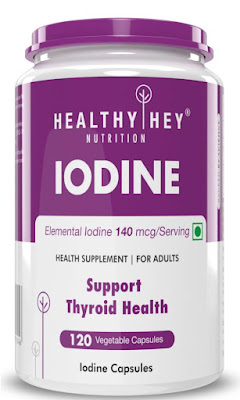Iodine deficiency is a significant global health problem that affects millions of people worldwide. Although this condition may seem obscure, its consequences can be serious, affecting physical and cognitive development, especially in pregnant women and children. In this article, we will learn in detail about the symptoms of iodine deficiency, its causes and possible solutions to reduce its effects.
Importance of Iodine:
Iodine is an essential micronutrient for the production of thyroid hormone, which regulates metabolism and supports proper growth and development. The body cannot produce iodine itself, so it depends on dietary intake to meet its needs. Adequate iodine intake is especially important during pregnancy and early childhood, as it plays a vital role in fetal brain development.
Symptoms of Iodine Deficiency:
- Goiter: One of the most recognizable symptoms of iodine deficiency is the development of goiter, which is an abnormal enlargement of the thyroid gland located in the neck. The thyroid gland enlarges in an attempt to compensate for inadequate iodine levels.
- Hypothyroidism: Iodine deficiency can cause the thyroid gland to become underactive, resulting in hypothyroidism. Symptoms of hypothyroidism include fatigue, weight gain, sensitivity to cold, dry skin, constipation, and hair loss.
- Cognitive impairment: Insufficient iodine intake, especially during pregnancy and infancy, can impair cognitive development in children. This can manifest as low IQ, learning disabilities, and developmental delays.
- Birth defects: Pregnant women with iodine deficiency are at risk of giving birth to babies with congenital anomalies, including cretinism – a condition characterized by severe physical and mental retardation.
- Miscarriage and stillbirth: Iodine deficiency increases the risk of pregnancy complications, such as miscarriage, stillbirth and premature delivery.
- Fatigue and weakness: Insufficient levels of iodine can cause generalized weakness and fatigue due to effects on thyroid hormone production and metabolism.
- Difficulty concentrating: Insufficient iodine intake can impair cognitive function, leading to difficulty concentrating, memory problems and reduced mental alertness.
- Delayed puberty: In adolescents, iodine deficiency can delay the onset of puberty and affect growth and sexual development.
Causes of Iodine Deficiency:
- Inadequate dietary intake: The primary cause of iodine deficiency is inadequate dietary intake of iodine-rich foods such as iodized salt, seafood, dairy products, and eggs.
- Geographical factors: Areas with low soil iodine content, such as hilly areas and inland areas away from the sea, suffer from iodine deficiency.
- Dietary restrictions: Individuals following a strict vegetarian or vegan diet may have limited access to iodine sources, increasing their risk of deficiency.
- Pregnancy and breast-feeding: Pregnant and breast-feeding women have greater needs for iodine to support fetal development and milk production, making them more likely to be deficient.
- Food processing: Food processing techniques, such as washing grains and vegetables with iodine-deficient water, can remove iodine from foods, leading to deficiency.
Solutions to Iodine Deficiency:
- Iodized salt: Universal salt iodization programs have been successful in many countries to combat iodine deficiency. Adding iodine to table salt ensures that the population receives adequate intake of this essential nutrient.
- Dietary diversification: Encouraging consumption of iodine-rich foods such as seafood, dairy products, eggs and seaweed can help improve iodine status.
- Supplementation: In high-risk groups, such as pregnant women and young children, iodine supplementation may be necessary to meet increased requirements.
- Public health initiatives: Education and awareness campaigns about the importance of iodine in the diet and the consequences of deficiency can help prevent and address the problem on a large scale.
- Fortification programs: Fortifying staple foods such as flour, cooking oils and spices with iodine can be an effective strategy to reach populations with limited access to iodine-rich foods.
Iodine deficiency remains a significant public health concern globally, with far-reaching consequences for individuals and communities. Recognizing the symptoms of iodine deficiency is important for timely intervention and prevention of long-term health problems. Through a combination of dietary strategies, supplementation, and public health interventions, we can work toward ensuring adequate iodine intake for all, promoting optimal health and development across the lifespan.

Comments
Post a Comment